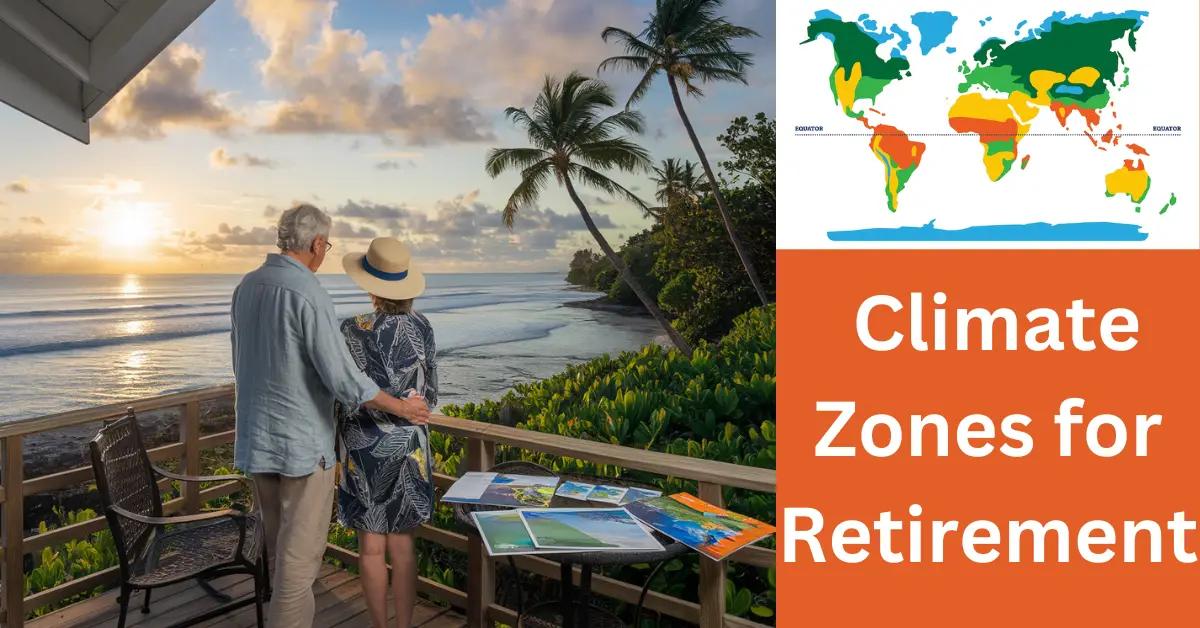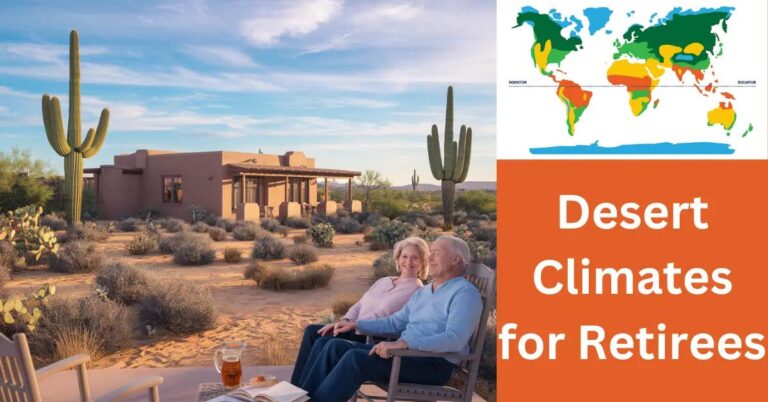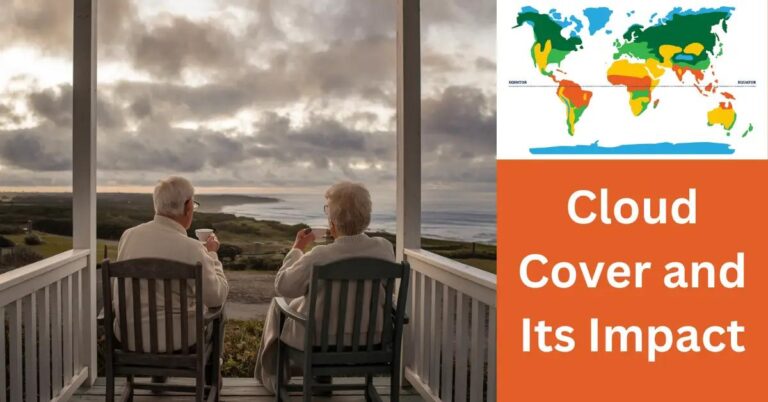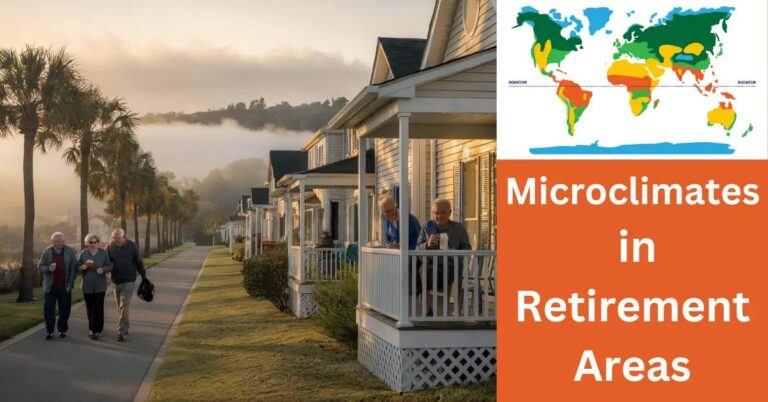TL;DR:
- Optimal retirement climates depend on personal needs; warm or mild regions are popular, e.g., Florida or California.
- Coastal areas offer scenic views and ocean-induced mood boosts; desert regions like Arizona have dry air for joint comfort.
- Research climates thoroughly, considering temperature, rainfall, health, and lifestyle impacts.
- Climate affects living costs: warmer zones may lower heating bills, but increase cooling expenses.
- Ideal tropical retiree destinations: Costa Rica, Thailand, Mexico with warm weather year-round.
- Favorable retirement countries: Spain, Portugal, Costa Rica, New Zealand, Mexico.
- Adapting to new climates involves understanding weather patterns, joining support networks, and health considerations.
- Consider climate's impact on physical health (e.g., joint pain) and mental health (e.g., SAD).
Are you dreaming of sunshine-filled days or crisp mountain air for your golden years? Choosing the right climate is a key part of retirement planning. Let's navigate the pros and cons of warm beaches, mild retreats, and vibrant deserts together. Understanding how climate shapes retirement life will help you make an informed decision. Dive into this guide for insights to choose the best retreat for a fulfilling retirement adventure!
What are the Best Climates for Retirees?
You might wonder, "What is the best climate for retirement?" The answer depends on your needs. Many retirees search for warm or mild climates. Warm climates like Florida offer sunshine and beaches. These can keep you active and happy. Mild climates, like California, bring comfort without the extremes.
Coastal areas are another choice and provide cool breezes and scenic views. The ocean improves mood and encourages outdoor fun. Desert regions have dry air, which can help joint pain. Places like Arizona or Nevada are popular for this reason. However, each climate has drawbacks. Warm spots may mean hurricanes or high humidity. Deserts can have hot days, but cold nights. You need a plan for these changes.
Is there a place with the best climate in the world to retire? Each person decides for themselves. Many retirees love places like Portugal for their pleasant weather and friendly locals. The best climates for retirees balance temperature, rainfall, and outdoor activities you enjoy.
Climate should be part of your retirement planning. It affects health, leisure, and social life. Consider how weather impacts your daily routine and hobbies. Environmental factors like air quality and natural disasters are also key. Research helps you avoid surprises later.
Understanding the pros and cons of different climates aids in decision-making. Think about how each environment fits your lifestyle and needs. Exploring and evaluating options ensures better planning. Keep in mind what makes each climate unique. This knowledge will lead you to your perfect home in retirement.
Use these insights to weigh the options. They help create a secure, enjoyable future in your new location.
How Do Climate and Cost of Living Influence Retirement?
When planning for retirement, cost of living and climate are key factors. The climate impacts the expenses we face daily. For instance, living in warm zones might lower heating bills during winter. Yet, hot summers could mean high cooling costs. It's essential to consider these expenses when deciding where to retire.
Energy bills are a significant part of our budget. In colder regions, your heating costs will rise, affecting overall living expenses. If we move to milder zones, energy bills could drop, freeing up money for other needs. Understanding energy costs by climate region is crucial in evaluating each location.
Budget planning needs to account for these differences. The cost of living is more than just housing or food. We must also include the climate impact on daily life. This understanding can shape financial plans, ensuring comfort and stability in retirement.
When considering relocation for better weather and taxes, it's important to examine financial advantages. Florida and Texas, for example, have no state income tax, and their mild climates can reduce living costs. Understanding these budget considerations is key when selecting the right place.
Financial planning for moving to a climate you like involves more than just travel costs. We need to include long-term expenses like healthcare, especially if we'll move far from family. Setting a detailed budget will guide us and help secure a satisfying retirement.
Each climate has unique appeal and challenges. From heating expenses in chilly regions to cooling needs in tropical places, climate affects our retirement budget. By thoroughly examining all aspects, we can pick a suitable climate that aligns with both our financial and lifestyle goals, crafting the perfect retirement.
Which Tropical and Warm Climates Are Ideal for Retirees?
Where is the best climate in the world to retire? The answer is often subjective. Many retirees pick warm climates due to their comforting temperatures and inviting environments. These warm and tropical zones can offer many health benefits, such as promoting an active outdoor lifestyle. The sun provides Vitamin D, which is essential for bone health. Warmer climates also reduce the risk of winter-related conditions like flu and colds.
The top tropical retirement destinations include places like Costa Rica, Thailand, and Mexico. Each of these countries offers unique cultures and experiences. Costa Rica, with its lush forests and beaches, provides a peaceful setting. Thailand boasts vibrant city life alongside serene beach spots. Mexico combines rich history with beautiful coasts. These destinations offer retirees warm weather year-round, often at a lower cost compared to other countries.
Popular warm-climate regions for retirees often have diverse communities and amenities. Arizona and Florida are American examples which attract many retirees. Both states have sunny weather and lack snowfall, making them popular for those leaving behind cold winters. These areas come with retiree-friendly features, such as golf courses, leisure activities, and senior centers, helping retirees feel at home.
Lifestyle advantages of warm climates are numerous. Warm weather encourages walking, swimming, and other outdoor activities, keeping retirees healthy. There’s less need to spend on heavy clothing and heating, which can save money. Many enjoy the relaxed social atmosphere found in warmer places, where communities gather outdoors year-round. Whether one seeks beaches, mountains, or deserts, warm and tropical climates offer inviting choices for a leisurely retirement.
Choosing the ideal retirement spot requires considering personal health, lifestyle preferences, and living costs. By weighing these factors, retirees can best select a place that meets their needs and enhances their golden years.
How Do Seasons and Retirement Lifestyle Interact?
Seasons can shape the joys and challenges of retirement life. When thinking about retiring, it's important to consider how weather affects daily routines. Many retirees love places where seasons bring mild weather throughout the year. So, where is it 60–70 degrees year-round in the world? In places like Ecuador and the Canary Islands, temperatures often stay mild. These spots offer comfort without extreme highs or lows.
Knowing how seasons impact your routines can guide your retirement choices. For some, summer teases the idea of long sunny days outside, while winter draws them closer to warm fires and hot drinks. Others might prefer the consistent warmth of tropical climates where swimsuits replace sweaters. Each season brings its own vibe, influencing lifestyle activities.
A yearly shift in climate can prompt some retirees to consider seasonal migrations. What are seasonal migration patterns for retirees? Many opt for "snowbird" patterns, residing in warm locales during the colder months. These patterns provide sunshine without the burden of intense summer heat elsewhere. Moving with the seasons can offer a refreshing change, livening up retirement life with diverse environments.
Choosing retirement spots involves more than just temperature checks. What does selecting a location with mild winters involve? It's about finding leisure opportunities that suit active or leisurely lifestyles. Warm winter retreats, such as Florida or parts of Arizona, are popular due to welcoming climates and vibrant communities.
Lastly, if you're pondering options for these warm retreats, explore common hotspots offering both action and relaxation. Look into places with friendly public spaces and lively neighborhoods. This way, the climate complements your desire for a fulfilling retirement lifestyle.
What are the Best Countries and Cities with Favorable Climates for Retirees?
When thinking about retirement, the best climate can make all the difference. Let's dive into the best countries known for retiree-friendly climates.
Spain tops the list with its mild winters and sunny days. Many retirees love living in cities like Barcelona and Valencia. Spain offers a warm, welcoming atmosphere and stunning beaches.
Portugal follows closely. Cities like Lisbon and Porto offer warm winters and cool summers. Portugal is known for its friendly people and delicious food, making it a top place for retirees.
Costa Rica offers a beautiful environment with its lush rainforests and lovely beaches. The weather is warm, and there’s plenty of sunshine. This makes it a haven for those who love nature.
New Zealand impresses with its diverse landscapes and mild climate. Christchurch and Wellington are popular retirement zones. New Zealand offers safety, friendly locals, and plenty of outdoor fun.
Mexico is renowned for its warm climate and low cost of living. Cities like San Miguel de Allende offer historic charm, making them a hit with retirees.
While these countries offer amazing climates, it's important to consider other factors. Cost of living, language barriers, and healthcare access are significant for those retiring abroad.
Assess the potential challenges of retiring based on climate. Hurricanes can impact Caribbean countries, while hot summers can be challenging in places like Spain and Mexico.
When deciding where to retire, choose a place that matches your climate preferences. Think about how the country's culture and lifestyle fit with yours. If you can visit beforehand, even better.
Feel excited about your next chapter in life. Find that perfect spot with the right weather for you.
How Can Retirees Adapt to New Climate Environments?
Adjusting to new climates can be daunting for retirees. Picking the right spot to retire is tough. Climate change makes it even trickier. Consider states like Florida or Arizona if you seek warmth and sunshine. Oregon and Washington are cooler, with lush greenery. But think about climate change's effects. Each state has pros and cons.
Moving from one climate to another needs smart planning. Here are tips for adapting. Start by learning about the weather patterns in your new area. Know the seasons and how they feel. Dress correctly for the climate. Change your wardrobe to match the weather.
Joining senior networks and support groups in the community is crucial. They offer helpful advice on climate adaptation for seniors. You can meet others who have adjusted well. They may share useful tips on managing day-to-day life. This support system can ease transitions and bring comfort.
Health is vital when moving to a new climate. Maintain a healthy lifestyle by exercising regularly. Keep medical checkups up to date. Some climates can trigger allergies or breathing issues. Early preparation helps manage these better.
Find resources designed for seniors to thrive in different climates. Local health centers or libraries often offer classes or info sessions. Regular visits to a doctor familiar with the area can help, too. They can offer guidance on maintaining wellness in the new environment.
Listen to your body in new environments. If you notice changes in energy or mood, seek advice from a healthcare provider. Adapting to a new climate affects both physical and mental well-being. Stay open to new experiences and accept local ways to enjoy your retirement fully.
What are the Implications of Climate Choice on Lifestyle and Well-being?
Choosing a climate is crucial for physical wellness. A warm climate can ease joint pain, while a cooler one might worsen it. Warm locales offer outdoor fun like swimming and gardening. These activities keep the body active and healthy. But too much heat can lead to dehydration or heat stress. Therefore, it's important to know your limits and stay hydrated.
Mental health is also affected by climate. Sunlight boosts mood. It helps fight seasonal affective disorder (SAD). However, constant high temperatures can cause anxiety or restless feelings. Finding a balance is key. If you need sunlight for your mental well-being, then a sunny place might be best.
In warm climates, leisure lifestyle thrives. Beaches offer relaxation. Outdoor cafes let retirees enjoy fresh air and social time. Nature trails provide perfect walking spots, mixing exercise with leisure. These contribute to both mental and physical health. In cooler places, skiing or hiking can be delightful activities.
Balancing climate preferences with well-being needs is essential. Think about what makes you feel good. Do you prefer warm sunshine or crisp winter mornings? Consider how the weather influences your moods and energy. Comfortable climate supports a fulfilling retirement life. Your choices will shape your daily life. Carefully weigh these aspects before deciding on a place.
Finding the best climate to live in involves understanding these impacts. The right climate for you supports both your body and mind. It allows for engaging leisure activities, helping you lead a happy life. Your climate choice influences your wellness and daily routines. It’s wise to choose a climate that aligns with your health and lifestyle needs. Consider what will make you most content and healthy in your new home.
Conclusion
Choosing the right climate for retirement can shape your golden years. We've explored various climates, from warm tropical paradises to mild coastal areas. Each offers unique pros and cons. Your climate choice affects cost, health, and day-to-day living. As you plan, balance budget concerns with lifestyle goals. Warm areas often improve health and offer year-round leisure. Meanwhile, mild regions save on energy costs, easing financial stress. Assess how seasons influence your activities and comfort. Connecting with fellow retirees can guide your decision. With careful planning, you can retire in a place that suits your climate needs perfectly.












